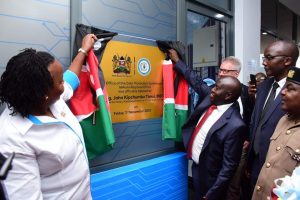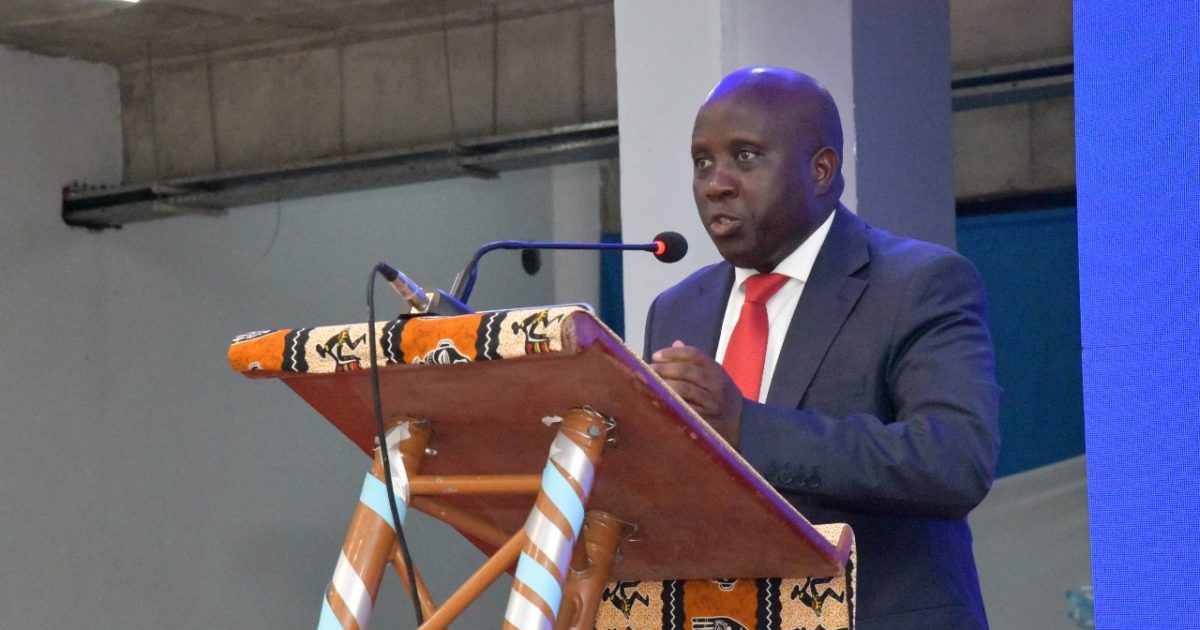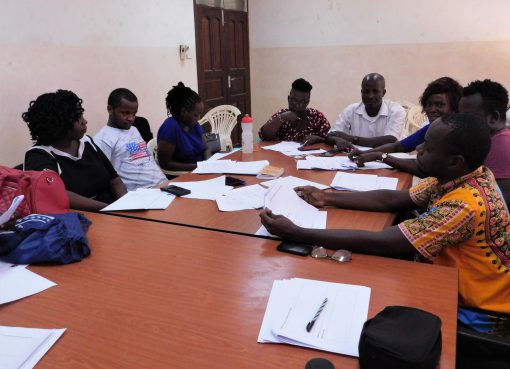The government has embraced a multi-faceted approach to revamp the country’s digital economy through massive investments in infrastructure and policies.
State Department for Information Communication Technology and The Digital Economy Principal Secretary Engineer John Tanui said the government has further launched a number of initiatives to promote digital skills development, such as the Ajira Digital programme while also rolling out digital architecture like the National Broadband Strategy.
He announced that going digital will be a game-changer in transforming the economy, creation of the much-needed jobs and in driving financial and economic inclusion.
Speaking when he officially unveiled the Nakuru -Regional Office of the Data Protection Commissioner (ODPC), the Principal Secretary said the government is establishing digital laboratories in the country to enable the students and the youth acquire digital skills for them to secure local and international job opportunities.
The Principal Secretary added that the digital skilling programme is part of the Kenya Kwanza government manifesto to transform the economy.
Engineer Tanui pointed out that the digital space was becoming increasingly important as a potential pathway to socio-economic development and employment creation in Africa, given the continent’s unique status as a region with the youngest population but the highest youth unemployment rate.
Kenya has a young and growing population with more than half of the citizens aged under 35 years, a situation the Principal Secretary noted presents an opportunity to boost the economy and create jobs.
Engineer Tanui said the platforms are the best solution in addressing unemployment among the youth.
He exuded confidence that the setting up of digital hubs in all the 1,450 wards across the country will bring massive benefits once fully implemented.
These hubs, he pointed out, will not only be instrumental in provision of digitized government services, they will enable innovative youths to tap the rapidly growing global e-commerce and digital economy for jobs and to boost their enterprises.
“Besides provision of high-speed internet connection, the hubs are designed to offer cutting-edge technical facilities and services which include meeting rooms, event and training spaces. Entrepreneurs and small businesses will also be able to interact and network which will help in sharing ideas and insights regarding their respective sectors. With such features, the centres have a huge potential to turn the tide of widespread unemployment in the country,” Engineer Tanui pointed out.
With formal employment becoming a challenge, the Principal Secretary said, digital programmes would widen opportunities of the youth who acquire new skills, in accessing the job market.
“Due to scarce formal jobs, the digital platforms present a solution to unemployment of youth. They can work from their homes and earn up to Sh200,000 which is good money to sustain themselves and their families. The only existing job in the world is in digital and the government is committed to supporting youths with digital technologies to secure jobs,” he said.
Engineer Tanui was flanked by Data Protection Commissioner Ms Immaculate Kassait and County Commissioner Loyford Kibaara.
He indicated that the government has identified technology as the centre-piece of its plans aimed at fostering job creation.
This, added the Principal Secretary, explains why Kenya Kwanza administration is focusing on projects such as digital superhighway, Konza Technopolis, digital hubs in wards, and free Wi-Fi in markets and trading centres.
Engineer Tanui disclosed that Konza has made admirable progress, inching closer to being a reality. Besides generating thousands of jobs, the smart city, alongside other digital initiatives will cement Kenya’s profile as a Silicon Savannah.
“The projects that are currently ongoing in Konza are an Intelligent Transport System and Integrated Control Centre, the establishment of a Startup Ecosystem and the development of Smart Logistics. The government has also allocated Sh5.74 billion for construction of the Kenya Advanced Institute of Science and Technology, a digital university domiciled within the Konza Technopolis,”
The university will train and produce graduates of science, technology and innovation as part of the government’s interventions to drive digital transformation through skills enhancement.
Under the country’s digital masterplan, Konza is also tasked with driving promotion of cloud services and data management.
Ms Kassait observed that there was a need for more public awareness and innovations to ensure personal data and privacy is protected by firms in the fast-evolving digital space.
According to the Commissioner there was a need for individuals, organizations, and governments to take measures to safeguard the confidentiality and integrity of personal data adding that proper implementation of privacy policies will ensure consumers and citizens have more control over their data collection practices and can feel confident when sharing information with third parties.
According to the 2021 Amnesty International and Open Institute opinion poll public understanding of the risks of invasive collection of personal data was dismal.
That poll found 67 percent of Kenyans were unaware of the Data Protection Act and only 46 per cent were aware of their right to privacy.

In Kenya, the Office of the Data Protection Commissioner is mandated to implement and enforce the Data Protection Act, 2019 and its regulations.
Ms Kassait indicated that her office had made strides in ensuring that Kenyans are not only aware of the existence of data protection laws and their rights but also putting into place mechanisms aimed at enabling easy and cost-effective legal compliance and exercise of the protected rights.
Notably, the ODPC has a working website through which any person can register as a data controller/data processor or file a complaint for a breach of personal data.
The website also carries useful resources including the relevant laws and regulations and guidelines on issues such as data protection impact assessments, consents, registration of data controllers and data processors, and complaints management.
The Nakuru office will serve as a central hub for data protection services in the region, providing guidance and support to organizations and individuals in understanding and complying with data protection regulations.
She announced that the Office has since established its presence in Huduma Centres in Nyeri, Garissa and Eldoret and is working on establishing more offices across ten additional regions across the country, which she said was a testament to their commitment to regulating the processing of personal data and protecting the privacy rights of our citizens.
Ms Kassait observed that technological innovations have created a new borderless world which contains a data ecosystem with information on every aspect of individuals’ lives.
The growth and collection of personal data she added posed a continual challenge to devise new data management and processing capabilities to keep pace with the ever-increasing data resource and technological advancements.
“The ability to harness the value of this data is critical for businesses and this challenge requires a collective multisectoral and multidisciplinary approach to find a balance between privacy and innovation. The protection of an individual’s privacy in relation to processing of personal data is a fundamental right,” added the Commissioner.
Ms Kassait observed that whilst data protection is still a new conversation in the African context, the objective of data protection frameworks is to give citizens more control over their personal data and increase accountability of institutions that hold personal data.
The Kenyan digital transformation agenda, noted the Commissioner, recognizes data as key enabler of digital trade to spur our economic growth, and an enabling data protection framework inspires confidence and trust for businesses to thrive.
“By bringing the Office of the Data Protection Commissioner closer to people, we aim to create more solid partnerships and foster a culture of data protection, enhance inclusivity and accessibility of data protection services to the public. I am happy to note that we as a country and especially industry have begun to appreciate and have discussions around personal data privacy and what that would mean for the reputation of an institution.”
She said on the other hand her office has also witnessed an increase in citizenry awareness on data privacy and Kenyans were now taking more control over their personal data.
However, she indicated more still needs to be done and that the Office has planned various public awareness initiatives targeting the citizens at the grassroots level on an awareness campaign on matters of data protection compliance requirements, data registration, and the rights of citizens in collecting, accessing and retrieving their personal data.
The ODPC is a government institution mandated with the regulation of the processing of personal data to provide for the rights of data subjects and obligations of data controllers and processors for connected purposes. The office was established by the Data Protection Act of 2019.
ODPC Act 2019 regulates the collection, processing and storage of personal data by both government and private organizations.The Act also establishes an ecosystem of rights and obligations that operationalizes the right to privacy enshrined in the Kenyan constitution.
Ms Kassait emphasized that citizens had the right to be informed, the right to access their personal data, the right to correction and the right to deletion in order to protect their privacy.
By Anne Mwale





